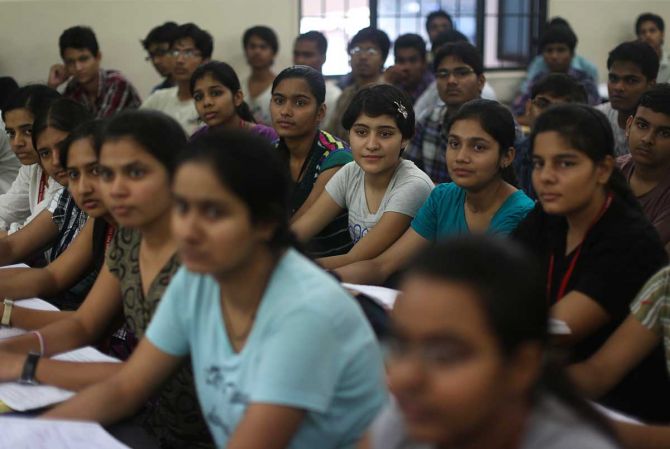25 student suicides in 2023 at India's coaching hub Kota have revealed the mindboggling stress children confront every day, reports Prakash Bhandari.

Kota, the Rajasthan city that made coaching for professional courses an industry and came to global attention for its turnover of students who successfully cracked tough competitive entrance exams like IIT-JEE and NEET, is in shock.
The spate of student suicides, 25 till September, has brought into question the teaching methods and the pressure exerted on students to make them excel -- the very same factors that earned the city global attention have now come back to question its credentials.
On one single day, two students at a very well-known coaching institute with a very good record, died by suicide.
It sent shockwaves across the state, leading Chief Minister Ashok Gehlot to ask for a report from the district collector.
Gehlot was critical of parents who send their teenaged children to Kota without ascertaining whether they have the potential to cope with the studies.
But the fault could lie with the coaching institutes which enroll students without judging their potential, and charge exorbitant tuition fees.
In Kota, the roads teem with hoardings advertising coaching institutes; clearly they have big budgets for advertisements.
The coaching institutes allegedly pressurise newspapers not to publish the names of the institution when someone dies by suicide.
"Stress is the cause of a large number of suicides and in the past 10 years over a hundred students have died by suicide," says Narendra Jerath, a resident of Kota.
"After 12 hours of study a student gets depressed and feels humiliated when s/he fails in the periodic tests. The coaching institutes should evolve a better teaching system to make studies stress free," Jerath adds.
A majority of the students are from Rajasthan itself, followed by Bihar, Uttar Pradesh and Jharkhand.

The late V K Bansal, an engineer by profession, became handicapped and lost his job in the 1980s. He started science tutorials over 35 years ago, which evolved into Bansal Classes.
Bansal turned Kota into an education hub with a dozen such schools, and Kota became a passage for those seeking admission to India's top engineering colleges.
Boys and girls come to Kota to prepare for the Joint Entrance Examination or JEE and the National Eligibility cum Entrance Test (Undergraduate) or NEET.
If they pass the JEE, it gains them admission to engineering colleges; Passing NEET qualifies them for admission to medical colleges.
Bansal would take IQ tests before enrolling a student and he evolved a coaching method that helped students prepare for the ultra-competitive engineering entrance examination.
He would not admit students who failed the tough IQ tests. It was for this reason that Bansal Classes recorded a high success rate.
"The coaching institutes have to produce good results for their survival. In recent times, some coaching classes in Kota, which had about 75 small and big coaching classes, shut down as they failed to produce results," says Vinay Krishna, a teacher.
"There are only four coaching institutes that give good results," Krishna adds.

Currently, there are 23 IITs in the country with 17,385 seats. About 1.5 million students appear for the JEE which is conducted in two phases. Only two percent of those who appear for the JEE pass the examination.
The boom in coaching classes has had its spinoffs too, in terms of fresh employment avenues opening up.
Kota saw several industrial units shut down, rendering thousands of workers jobless.
Many workers set up hostel and catering businesses that today serve about 200,000 students who come to Kota every year with hope in their hearts.
In recent years, hostels have mushroomed in Kota and large buildings have come up near areas where the coaching institutes are located.
Believe it or not, there are 2,600 hostels in the city.
Some students live in rented rooms. Owners of hostels rent out airconditioned rooms to students who can afford it.
Some parents prefer hostels that allow the mother to stay with the child and cook meals. In such cases the students are not so stressed as a parent is around to offset any study pressures.
"I spend five hours at the institute getting coaching and seven hours at home to study and prepare so I need comfort. My parents pay for airconditioned accommodation and food," said Abeer Sinha, who has come to Kota from Bettiah in Bihar.
Most of the students though come from middle or lower middle class families and their parents bear the expenses of educating their children in Kota with much difficulty.
Some parents of students from Bihar and Uttar Pradesh have had to mortgage property to support their children's education dreams.

In Bihar there is a trend to send children to Kota without ascertaining if they have the potential or calibre to pass JEE or NEET.
"I come here once in three months to check on my son, but I know nothing is for sure whether he will make it," says Alok Sinha, a bank officer.
"But I feel my son will be conditioned to face competition examinations and the time spent in Kota would not go waste," Sinha adds.
"The expense factor is very crucial as the parents often remind their children that they are spending hard-earned money on their studies. The demand of parents is very high, which puts the children under stress," says Krishna Baldev Hada, a senior journalist who has seen the growth of Kota's coaching hubs.
"The regular reminders and taunts from parents and relatives have an adverse effect on the students when they fail to do well in the periodic tests," Hada points out.
"Failure or poor marks in the periodic tests have an adverse effects on the students, who think of suicide as a way to end their stress," he adds.
Most of the students come to Kota when they are in the 11th standard. But some like Divanshu Jain from Maharashtra came early, from the ninth standard itself.
"I came to join from the ninth standard so that I could cope with the studies when I am promoted to Class 11 and 12," says Divanahu.
"Studying in Kota's coaching institutes requires some tuning, so I joined earlier to get accustomed to it," the teenager adds.
Kota's institutes have a tough syllabus and students have to undergo frequent periodic tests to know their progress. They have no free time to relax or, say, go and watch a movie or socialise.

"The periodic tests are unavoidable because they give the institutes an idea as to how the students have progressed. Even the parents are keen that the students should be tested frequently so that s/he could know the progress made," says Hada.
"Even after the recent suicides, when the state government put a ban on tests for some time, the parents told the state government that the tests are unavoidable. The parents' insistence is justified, as how else would they know the progress made by their children," asks Hada.
The state government appointed a committee of ministers to discuss the Kota suicides. While one minister, Pratap Singh Khachariyawas, felt the government should regulate the coaching institutes and frame rules on their working, Mahesh Joshi, the state public health minister, said that the coaching institutes were only interested in making money and demanded that they should be shut.
Gehlot sent a committee to Kota to find the reasons for the high suicide rate.
"Yes, the parents send their children to Kota incurring a lot of expenditure. Often the suicides are caused by stress and the inability of students to cope with studies and fulfill the aspiration of their parents," says Shanti Dhariwal, Rajasthan's urban development minister, who hails from Kota.
"But in a recent case a girl died by suicide and the reason was a failed relationship. So all the suicides are not because of stress," adds Dhariwal.
The Oxyzone park built in the city's Mahaveer Nagar area at a cost of Rs 120 crore (Rs 1.2 billion), the minister adds, has been built so that students could spend some time there every day to refresh themselves and reduce their stress.

On an average students spend Rs 15,000 to Rs 30,000 a month; rich students who have hired private accommodation and maintain their own vehicles and servants spend up to Rs 40,000 to Rs 50,000 a month.
Bhawani Singh Detha, IAS, principal secretary, Rajasthan's higher education department, held a meeting with various stakeholders that included coaching institute representatives.
He also met the hostel owners and various social groups. Some parents insisted on devising new test systems and reduction in the timing of coaching classes.
The coaching institute representatives stated that in a majority of death by suicide, it was because of poor results in the periodic tests.
"At the meeting District Collector S K Bunkar and Principal Secretary Detha asked us to give solutions to end suicides," says the owner of a leading coaching institute, speaking on condition that his name would not be disclosed in this report.
"The state government suggested that we not conduct classes or tests on Sundays and holidays. We would very much forego the regular tests, but the parents insist on such periodic tests to know how their children are progressing," he adds.
"On Sundays sometimes we hold tests and this is because on normal days we engage them in classroom teachings," the owner says.

Rajib Dasgupta of the Centre Of Social Medicine and Community Health, School of Social Sciences feels that Kota has become a suicide cluster.
"It is a case of a point cluster where a greater number of persons commit suicide within a time period in a specific location. But in the case of Kota the suicides are reported not at a specific point in time, but through the year in preparation for the examination," says Dasgupta.
"Suicide clusters among students such as in Kota are a matter of concern. It calls for advanced preparations, to be vigilant for suicides," he adds.
"Efforts should be made to halt the 'suicide contagion'. The students and community (parents) should be taught about the risk of suicide, warning signs and counselling and above all surveillance to identify and monitor occurrences of the suicide acts," explains Dasgupta.
Dr M L Agarwal, a veteran psychiatrist who runs a helpline for students in Kota, has treated a number of students and helped them handle their stress.
Coaching institutes in Kota do have departments that counsel students, but they encounter parents who ask the counsellors how their child can become an engineer or doctor.
"Kota's coaching institutes now have to compete with equally good institutes in Delhi and in the south," says Jai Krishna Shringi, a hostel owner in Mahaveer Nagar.
"Moreover, there are no suicides in cities other than Kota. Thus, we have to examine the truth behind the suicides," Shringi adds.

Kota's Superintendent of Police Sharad Choudhry feels there are various reasons for student stress -- long study hours, emotional stress and ridicule by friends who have done well academically.
"Suicides can be stopped only if students who can cope with the strenuous drill are selected after proper screening," says Utsav Babel, a young man from Kota.
"Kota, even after the suicides, will remain a hot destination for aspiring engineers and doctors," says Utsav. "But the coaching institutes should not act as greedy businessmen. They should hold IQ tests and entrance examination before granting students admission."
"Only the best would be admitted who can cope with the strenuous syllabi. This is one way of tackling suicides."
Feature Presentation: Ashish Narsale/Rediff.com









